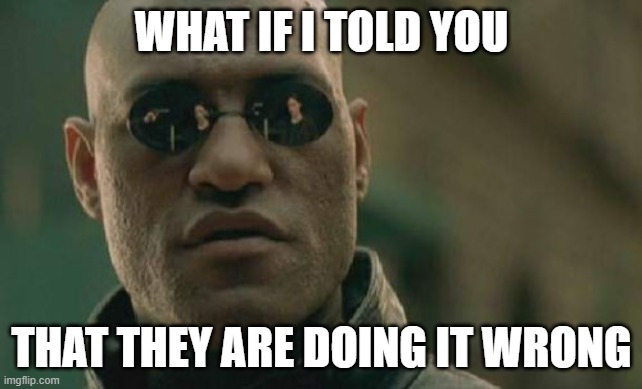


All of these are examples of Patrons.
Introduction
Listen to a video by CondorDM, The RPG Pundit, or one of the many blathering fools in the Current Edition sphere. Sooner than later you will hear them talk about how the Referee must waste precious time coming up with an antagonist, then devising a suitable Villainous Plot for that antagonist, and then spent hours on end writing notes, drawing maps, crafting encounters, etc. all in the hope that the players at this table take the bait and go after that antagonist Non-Player Character (NPC) instead of doing what they want to do.
How many blog posts, supplementary products, YouTube videos, and other media--totalling up to decades of time--are wasted trying to wrangle players into following along with what the Referee wants? At this point, I would not be inaccurate to say that if you read/watched/listened to all of it from start to finish that a child born at the same time that several years would pass before you were done.

Player & Patrons
The solution to this issue--and dear God is it a known and regular complaint--is to make this part of the game.
I shall refer to this class of character as a Patron. As the term implies, this is a character of significance in the campaign who is to provide aid to other characters in return for assistance from them as required. This can be a formal patron-client relationship, but for our purposes it is sufficient to consider anyone capable of having singular impact on the course of a campaign's events as a Patron and the area--literal or metaphorical--over which they hold dominance as their Domain.
The key problem with the typical position where the Referee runs all Opposition Forces, along with many others I've previously described, is that it presumes that his players will accept whatever is set before them as if they were starving men ushered into an all-you-can-eat buffet of dubious quality. That there is copious literature complaining about players not conforming to this presumption points to the error: no one asked them if this would be fun or not.
Putting Patrons into the hands of players, and having those players play out a strategic-level wargame on top of the typical adventure gameplay that is commonly sold to prospects and talked about elsewhere, solves the "Players don't want to do the adventure" problem.
The Referee recruits players to take up the roles of the Patrons. These can be people who also play ordinary Player Characters (PC), but it is also an opportunity to widen the ability for people to participate by recruit specifically those who wish to play but cannot regularly attend or cannot at all.
This creates a second layer of campaign play, above that of the individual scenarios played out at the table, and it is primarily done away from the table. The opportunity for a second layer of play, one focuses on the wargame roots at the strategic (i.e. big picture) level, is so long neglected that most RPG hobbyists don't even know that it exists and yet it can be found in the manuals of the day.
Having Patrons drive exploration because their campaign objectives and ambitions require it brings the campaign to life in the very ways so many RPG hobbyists talk about but fail to achieve. Having Patrons drive the economy because of these things has the same result. Adventure requires opportunity, and that opportunity must be sincere; players creating the opportunities for other players is exactly that because Patrons are as bound by the rules as any other player, and a now-disinterested Referee can be relied upon to administer such interactions dispassionately as he has no investment in the outcome.
The Benefits Of Patron Play
How? By having the Patrons plot, scheme, and act against each other they create the events that define the campaign. Those interactions, as well as the knock-on effects of the Patrons' actions seperately, will have moments of uncertainty where the result can go either way. I refer to these as "Points Of Decision", and these are emergent gameplay scenarios where a handful of ordinary Player Characters (PC) are able to make that outsized impact happen.
In a similar manner, Patron activity drives the exploration of an area and the development of resources; this inevitably leads to the discovery and development of Points Of Interest--ruins, mines, strongholds, monster lairs, Weird Phenomena, etc.--that act as wild cards in a campaign and prevents things from becoming too predictable. Delve too deep and you can uncover a ruinous power, happen upon a dragon's lair (and its hoard), or secure a strategic location to for that Magic-User you've been working for to build his new tower- for which he will reward you handsomely.
Players selected to run Patrons can be trusted to draw maps of Patron locations, administer their Domains (under Referee oversight), and other downtime work that otherwise is a Referee's problem to solve. Why not let the Patron players do it and allow them to enjoy the game more than just sending in orders every few days?
This leaves the Referee free to focus on mastering the rules of the game, administering them properly, and allowing him to remain utterly neutral (and thus trustworthy) in his adjudication. All he needs to do is not think he is like God, or even the Pope, but instead a humble arbitrator guaranteeing fair play by all concerned.
This still needs to be further specified, so tomorrow we'll talk about what a Patron player ought to do (and expect)- and how to select them.
No comments:
Post a Comment
Anonymous comments are banned. Pick a name, and "Unknown" (et. al.) doesn't count.